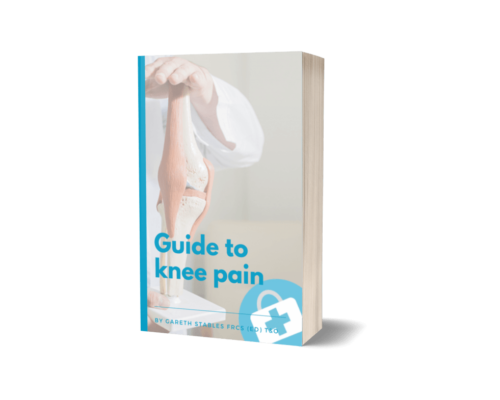Steroid Injections for Knee Pain
What is a steroid?
Some steroids occur naturally in the human body. Artificial steroids act like natural steroids to reduce inflammation.
They’re different to the anabolic steroids used by body builders to increase their muscle size and strength.
A number of different steroids are available for injection. Common examples of steroid
injections are:
- hydrocortisone (hi-dro-cor-tee-zone)
- triamcinolone (try-am-sin-o-lone)
- methylprednisolone (meth-al-pred-niss-o-lone) this is commonly used in joint injections.
How do steroid injections work for knee pain?
If your knee joints are very painful and inflamed, or you need extra pain-relief, you may be offered a steroid injection to treat your knee pain.
The steroid injection can reduce the inflammation in your joint which in turn should reduce your knee pain.
Steroid injections can’t treat the underlying cause of your condition, but they can treat the symptoms.
Some steroid injections start to relieve pain within hours and the effects should last about a week. Your doctor or other healthcare professional might call these short-acting soluble steroids.
Other steroid injections can take around a week to become effective but can ease your symptoms for two months or longer. These are the ones that I prefer to use for my patients. Long-acting steroids.
How quick the treatment works, and how long it lasts will also depend on your condition.


How is the steroid given?
Your doctor or nurse will talk to you about the most appropriate steroid mixture and dose for you. This will depend on your condition and symptoms.
Depending on where the pain and inflammation is, steroids can be injected:
-
- directly into an inflamed joint, this is known as an intra-articular injection
- into the soft tissue close to the joint, which is called a peri-articular injection
- into a muscle, which is called an intra-muscular injection.
Most injections are quick and easy to perform. We are usually able to perform these in the clinic on the same day as your consultation.
You may need an ultrasound scan to find where the inflammation is, so the steroid can be injected into a precise spot and have maximum benefit. An ultrasound scan uses high-frequency sound waves to create an image of part of the inside of a body. Most injections can be given without the need for ultrasound.
Most of the time I give a local anaesthetic mixed with the steroid to reduce the discomfort of the injection. This means your pain should be relieved within minutes. The effects of local anaesthetics can wear off within a few hours, although I usually give one that is long acting. You may have some numbness and pain-relief from the anaesthetic that could last up to 24 hours.
What should I do to prepare for a steroid injection?
You don’t really have to do anything special really. Make sure you’ve had something to eat and drink before you come to the clinic. Wear some loose-fitting trousers or shorts as you might find these more comfortable.
You might be advised to wait for 10 to 15 minutes in the clinic after your steroid injection. If you do have any kind of reaction to the injection, it would be helpful to be around healthcare professionals.
What else do I need to know before I have a steroid injection?
You will not be able to have a steroid injection if you have an infection, particularly if it’s in the part of the body that needs treating.
If you have diabetes you’ll need to discuss this with your doctor or other healthcare professional, because having a steroid injection can raise your blood sugar levels for a few days after the injection. It is important you monitor your blood sugar levels after a steroid injection.
There is some evidence that having too many steroid injections into the same area can cause damage to the tissue inside the body. Your doctor will probably recommend you don’t have more than three steroid injections into the same part of the body within a year. You may be advised to have less than that depending on your symptoms.
If you have a condition called haemophilia (he-mer-fill-ee-ur), which means your blood doesn’t clot properly, you’ll need to discuss this with your doctor, as you could be at an increased risk of bleeding into the joint.
It’s important not to overdo it for the first two weeks after a steroid injection. There is a small risk that if you exercise a joint too much immediately after a steroid injection you could damage the tendon.
What are the side effects of Steroid Injections?
Most people have steroid injections without any side effects. They can be a little uncomfortable at the time of injection, but many people feel that this is not as bad as they thought it was going to be.
Occasionally people notice a flare-up in their joint pain within the first 24 hours after an injection. This usually settles by itself within a couple of days but taking simple painkillers like paracetamol will help.
The risk of side effects is greatest with the stronger mixtures – methylprednisolone and triamcinolone.
Injections can occasionally cause some thinning or changes in the colour of the skin at the injection site, particularly with the stronger ones.
Very rarely you may get an infection in the joint at the time of an injection. If your joint becomes more painful and hot you should see your doctor immediately, especially if you feel unwell.
People are often concerned about the possibility of other steroid-related side effects such as weight gain. One of the advantages of steroid injections compared to tablets is that often the dose can be kept low. This means that these other side effects are very rare unless injections are given frequently, more than a few times per year.
How can arrange to have steroid injection?
If you think that you might benefit from a steroid injection we can usually perform these in the out-patient clinic. If you’re funding your own treatment or have health insurance you can contact us on 01614646399 or fill in the contact form on my website.
We’ll usually be able to perform the injection within a couple of weeks.
Many GPs can provide this service so you could contact your own doctor to see if they can help, although this can sometimes take a bit longer.



